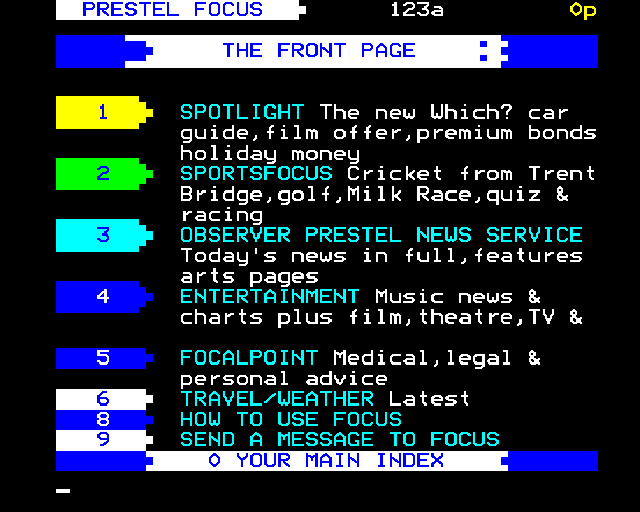WallGames: Online in the mid-1980s
I'm going to tell you about myself when I was about 11 or 12, and there's just no way that won't be embarrassing in some way. But mostly this is a nostalgia piece about getting online in the mid 1980s, and what that can tell us about our digital way of 21st-Century, post-COVID life. So focus on that, rather than how nerdy I was, and still am.
I am part of the ZX Spectrum generation. The Spectrum was a truly wonderful machine that indirectly created billions of pounds of GDP for the UK in that so many of us went on to work as software developers, set up tech companies, or were otherwise inspired to innovate in one way or another. I knew a bit of BASIC, but the only proper program I ever wrote was a somewhat flawed cricket scoring application. You see, in 1985, in order to use the program, one would have had to take the school BBC Micro (and CRT monitor) out to the cricket pitch using a very long electricity extension cable. My pioneering work in the field of sports data analytics was stifled at birth: computing weighed a lot, was definitely not mobile, and I don't really like cricket enough to sit out in the sun for an entire afternoon inputting data.
My perspective on computing changed suddenly one evening in the early 80s, when I was shown a Prestel terminal. Prestel was a dedicated information terminal that in those days was provided by the Post Office, that a relative of mine used one to get the prices of his share portfolio. Since I didn't know what a share portfolio was, it was a lot more impressive to see this connected device, that could look up data on a wide variety of subjects, with data appearing in an instant and being constantly updated by someone, somewhere.
Prestel, probably a later iteration given the fancy colours
Yes, this looks like Teletext, but would be even more recognisable to the French, whose Minitel equivalent was part of the fabric of daily life in France even into the 1990s. Uptake of Prestel was poor by comparison - it just seems I stumbled into it by accident.
In 1983, the film WarGames came out, featuring a plot in which a young Mathew Broderick nearly causes global thermonuclear war by getting his home computer online via a magical device known as a Modem, a box featuring rubberised cup-holes into which one physically inserted the telephone receiver. By the time I saw that movie, I had the Spectrum but no way whatsoever to connect it to anything. Let's not forget that the world wide web didn't yet exist. Then some friends of mine got a Modem for their BBC Micro - their father had a subscription to Prestel which must have been this:
The future of everything - in 1985
So, inspired by WarGames, my friends and I set about hacking into... absolutely no-one, and nothing. It turns out this hacking business needed some actual technical knowledge. So instead we, I believe the saying goes, used to 'surf the web'. We played simple games. We accessed educational information. And of course, we tried our best to find inappropriate sexual content, with no success. I told you, I was 12.
As soon as I could find one, I bought a modem for the Spectrum. It can't have been cheap, it came with no real instructions, and I had no idea how to proceed - yet I was convinced that this was the way forward. I set the modem up - power on, RS232 connection ok... but what's this? It seems my house was still wired for pulse-dialling (i.e. a rotary dial telephone) and not tone-based. So there I was, defeated within 5 minutes, with a pile of completely useless equipment, and a situation that couldn't be rectified until BT modernised. Game over!
I hadn't thought about this episode of utter ineptitude until very recently when I was explaining to my son what the various different layers of communications infrastructure are in the UK, and how they have evolved over the years to give us the wireless integrated services we have today. The promise of the early 1980s has, to my mind, been completely fulfilled and we are living in an age of technical miracles. So, dear son, don't complain so much about Fortnite being 'laggy'. (You should have taken that headshot anyway.)
We are also living through an age of rapid change. The journey I describe above was the first chapter in my the awakening of my digital self. I am also aware of the fact that this was not most people's journey to where we are today. For most of us, these early awkward steps were not necessary at all - even as late as 1995, only 20% of UK households had a computer of any kind.
Most people acquired their 'digital selves' in the last 20 years or so, working on a skeumorphic computer 'desktop' and using applications rather than inputting command lines. And anyone under 20 has grown up believing that display screens are normally touch-based devices. I used to be yelled at for getting fingerprints on the Trinitron.
The more serious point is that now, with our physical location truly irrelevant to our ability to interact with others, we must cultivate a more nuanced general understanding of the digital self. Our behaviours are changed by the technology that we use, and there is no longer any excuse for being passive in the face of that. As we all know, behaviour online is routinely atrocious, revealing the worst traits of the human race, barely offsetting the cat gifs that have brought such joy to so many. As technology progresses we must make sure that we never lose sight of the journey itself; we need to reflect on the changes that the new technology is bringing about for the humans that designed it. After all, like the WarGames movie, what inspired so many of us in the first place is not just the endless possibilities of the connected world, but also the terrible danger.


